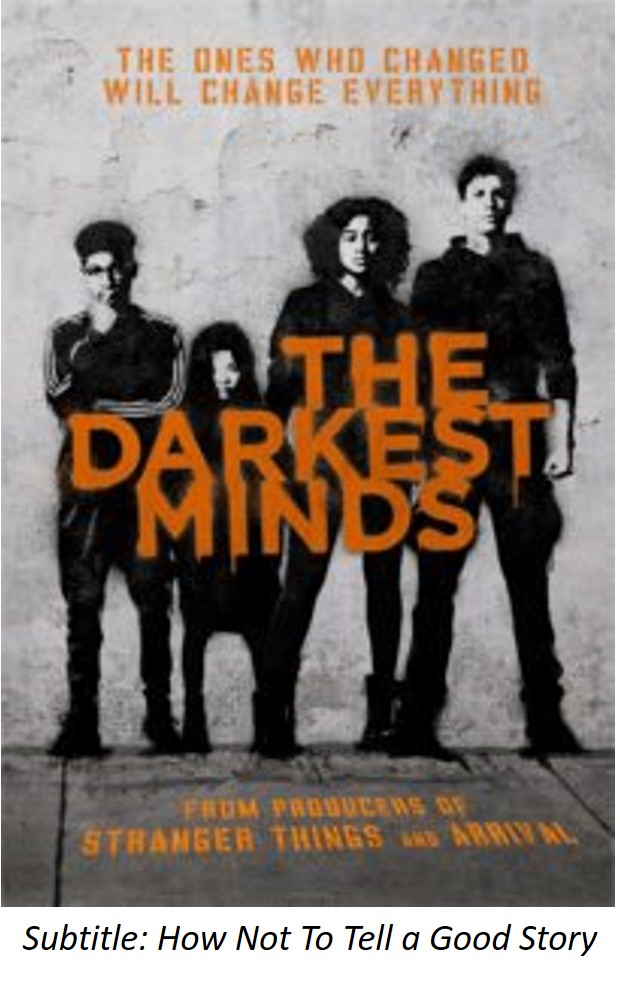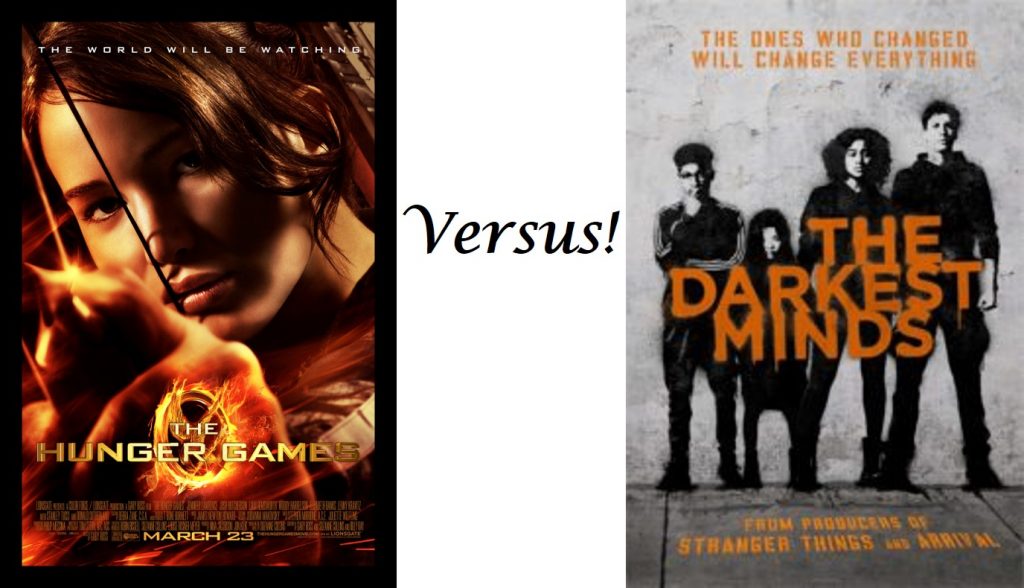[This blog was originally published in Night Owl Reviews]

You may have blinked and missed it, but The Darkest Minds movie released in August 2018 is one of the most recent Young Adult (YA) dystopia joints adapted from a popular novel to crash and burn at the box office.
Cue the proclamations from on-high that the YA dystopia genre is dead. DEEEEAAAAD!!
But it’s unfair to blame an entire genre for the failure of an individual movie. While the Han Solo movie also performed below expectations nobody declared science fiction dead, or that thrillers were dead when The Snowman garnered scathing reviews. The Darkest Minds didn’t fail because audiences don’t want YA dystopias, but because it was a bad movie that flunked the basics of Storytelling 101.
So where did The Darkest Minds go wrong? …And, of course, how can you avoid those same mistakes in your own story?
First, it’s important to note that rarely does a story succeed or fail based on only one thing. Since The Darkest Minds movie followed the book nearly beat-for-beat, it also ported in all the book’s strengths and weaknesses. However, a book’s longer length usually means it has a richer narrative that can distract from its flaws in ways a relatively short movie can’t.
What I’m saying is this: The Darkest Minds, both the book and the movie, suffer from a critical flaw readers of the book forgave but viewers of the movie did not—and that flaw is a lack of meaningful choice.
When we say a main character should “have agency,” what we literally mean is they should make meaningful choices that determine the narrative arc of the story. Looking back at all the critical ingredients that make up a story, every story beat (with possibly the exception of the Inciting Incident) is also a decision point where the protagonist(s) makes a choice that affects the rest of the story going forward. When there’s no choice, the characters float through the story, reacting to the plot rather than driving it. And though you may end up with a coherent story, it’ll be flat and unengaging because the reader/audience won’t understand or empathize with the characters—after all, it’s the choices you make under pressure that define who you are.
So let’s compare The Darkest Minds (“Minds”) with a successful YA dystopian adaption, say The Hunger Games (“Games”). On the surface, the stories are very similar. Both star teen girls at the bottom of the social hierarchy after society’s collapse into an amoral mess. Through random chance, both heroines are thrust into life or death situations where they must rely on their special skill sets to survive. Both also heavily rely on a group of secondary characters for support, some of whom are secretly or overtly their opponents. And both have strong romantic subplots, as well as a trilogy structure where the heroines eventually become pivotal in overthrowing the corrupt government.
Where these two stories diverge is in the execution. Simply put, Katniss—heroine of Games—makes meaningful choices that affect the course of the story; Ruby—heroine of Minds—does not.
To illustrate this, here are the major beats of each story (spoiler warning, obvs):

Inciting Incident:
- Games: Katniss’ sister is randomly picked to participate in The Hunger Games, an annual government-mandated fight-to-the-death amongst teenagers that’s televised for the country’s amusement; Katniss volunteers in her place
- Minds: A group of mysterious people break Ruby out of the internment camp for kids with superhuman powers she’s been held in for the last six years
Plot Point 1:
- Games: Katniss decides to cooperate with Peeta, her male counterpart in the Games, in order to form an alliance that will help them both survive
- Minds: Ruby runs away from her would-be rescuers, stumbles upon another group of kids headed to a promised land led by a mysterious figure called the Slip Kid; she lies and tells them she has benign Green powers (super-intelligence…in this universe it’s benign, so just go with it here) rather than her true supposedly malignant Orange powers (mind control)
Midpoint:
- Games: After running away from all confrontation when the Hunger Games start and barely surviving an attack thanks to an assist from Peeta, Katniss decides to go on the offense
- Minds: On instinct, Ruby reveals herself to be an Orange in order to save her own life; her pals are fine with that and the revelation doesn’t change their group dynamics
Plot Point 2:
- Games: When it’s announced that two people from the same district will be allowed to win the Games, Katniss makes it a priority to save not just herself but Peeta as well, and changes her Hunger Games strategy accordingly
- Minds: Ruby and pals stumble upon another group of kids who take them to the promised land, where Ruby meets the Slip Kid who’s another Orange; he offers to teach her to use her powers, she accepts
Climax:
- Games: When the rules are changed at the last minute to allow only one winner, Katniss and Peeta decide to commit suicide together, thereby sabotaging the Games; they’re stopped at the last minute and both declared winners of the Games
- Minds: Slip Kid reveals himself to be evil right as bad government people attack the promised land; Ruby fights with him, he gets away (note that in the movie, the Slip Kid/Ruby fight ends in a relative stalemate. In the book, the Slip Kid easily incapacitates Ruby, then literally walks away because…???; Ruby recovers, then runs and hides until the attack is over…um, you go girl?)
Denoument:
- Games: Katniss is warned that though she may have won the Games, she’s started a quiet rebellion and the government is now gunning for her
- Minds: After escaping the fall of the promised land, Ruby wipes her love interest’s memories and sends him away because she figures he’ll be happier without her
As you can see, Katniss is an active agent in her story with a strong, singular goal—to win the Hunger Games. Ruby doesn’t really have any goals; the closest she comes is a desire to reunite with her parents, which she immediately bails on the moment it looks like it won’t go well. She doesn’t make any major decisions for herself, the denoument being the only notable exception. The result is an uninspired story with a bunch of characters we don’t care about, fighting for stakes that aren’t dependent on anything they do.
How do you avoid this problem? By making every major plot point in your story the result of a decision your protagonist makes. Don’t just make stuff happen and have your protagonist react to it…okay a LITTLE of this is okay, for instance in a natural disaster-type story or for the inciting incident, but your main character still needs to be forced to make major decisions that affect the rest of the plot. Otherwise, you end up with a story with no soul—and a box office bomb.
